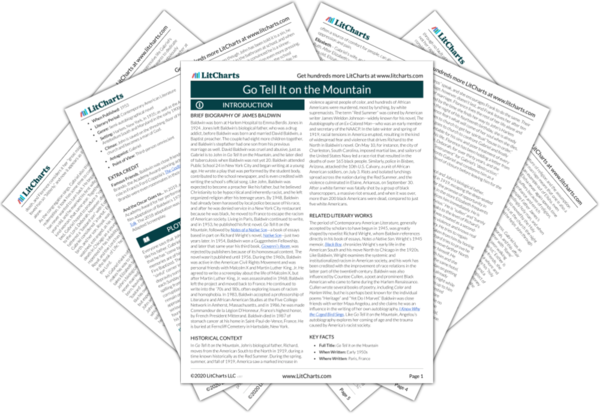Florence Quotes in Go Tell It on the Mountain
She had always seemed to Florence the oldest woman in the world, for she often spoke of Florence and Gabriel as the children of her old age, and she had been born, innumerable years ago, during slavery, on a plantation in another state. On this plantation she had grown up as one of the field workers, for she was very tall and strong; and by and by she had married and raised children, all of whom had been taken from her, one by sickness and two by auction; and one, whom she had not been allowed to call her own, had been raised in the master’s house.
Gabriel was the apple of his mother’s eye. […] With the birth of Gabriel, which occurred when [Florence] was five, her future was swallowed up. There was only one future in that house, and it was Gabriel’s—to which, since Gabriel was a manchild, all else must be sacrificed. Her mother did not, indeed, think of it as sacrifice, but as logic: Florence was a girl, and would by and by be married, and have children of her own, and all the duties of a woman; and this being so, her life in the cabin was the best possible preparation for her future life. But Gabriel was a man; he would go out one day into the world to do a man’s work, and he needed, therefore, meat, when there was any in the house, and clothes, whenever clothes could be bought, and the strong indulgence of his womenfolk, so that he would know how to be with women when he had a wife.
When men looked at Deborah they saw no further than her unlovely and violated body. In their eyes lived perpetually a lewd, uneasy wonder concerning the night she had been taken in the fields. That night had robbed her of the right to be considered a woman. No man would approach her in honor because she was a living reproach, to herself and to all black women and to all black men. […] Since she could not be considered a woman, she could only be looked on as a harlot, a source of delight more bestial and mysteries more shaking than any a proper woman could provide. Lust stirred in the eyes of men when they looked at Deborah, lust that could not be endured because it was so impersonal, limiting communion to the area of her shame. And Florence, who was beautiful but did not look with favor on any of the black men who lusted after her, […] reinforced in Deborah the terrible belief against which no evidence had ever presented itself: that all men were like this, their thoughts rose no higher, and they lived only to gratify on the bodies of women their brutal and humiliating needs.

Florence Quotes in Go Tell It on the Mountain
She had always seemed to Florence the oldest woman in the world, for she often spoke of Florence and Gabriel as the children of her old age, and she had been born, innumerable years ago, during slavery, on a plantation in another state. On this plantation she had grown up as one of the field workers, for she was very tall and strong; and by and by she had married and raised children, all of whom had been taken from her, one by sickness and two by auction; and one, whom she had not been allowed to call her own, had been raised in the master’s house.
Gabriel was the apple of his mother’s eye. […] With the birth of Gabriel, which occurred when [Florence] was five, her future was swallowed up. There was only one future in that house, and it was Gabriel’s—to which, since Gabriel was a manchild, all else must be sacrificed. Her mother did not, indeed, think of it as sacrifice, but as logic: Florence was a girl, and would by and by be married, and have children of her own, and all the duties of a woman; and this being so, her life in the cabin was the best possible preparation for her future life. But Gabriel was a man; he would go out one day into the world to do a man’s work, and he needed, therefore, meat, when there was any in the house, and clothes, whenever clothes could be bought, and the strong indulgence of his womenfolk, so that he would know how to be with women when he had a wife.
When men looked at Deborah they saw no further than her unlovely and violated body. In their eyes lived perpetually a lewd, uneasy wonder concerning the night she had been taken in the fields. That night had robbed her of the right to be considered a woman. No man would approach her in honor because she was a living reproach, to herself and to all black women and to all black men. […] Since she could not be considered a woman, she could only be looked on as a harlot, a source of delight more bestial and mysteries more shaking than any a proper woman could provide. Lust stirred in the eyes of men when they looked at Deborah, lust that could not be endured because it was so impersonal, limiting communion to the area of her shame. And Florence, who was beautiful but did not look with favor on any of the black men who lusted after her, […] reinforced in Deborah the terrible belief against which no evidence had ever presented itself: that all men were like this, their thoughts rose no higher, and they lived only to gratify on the bodies of women their brutal and humiliating needs.











